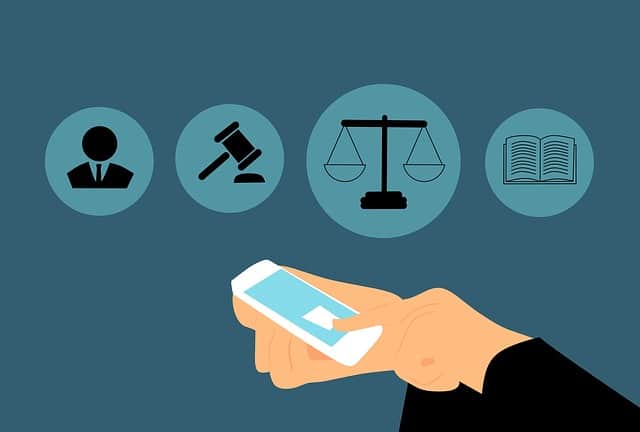




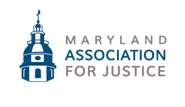




"Thank you so much for all your guidance and support during this difficult period in my life.I Will Never Forget Your Compassionate Professionalism And Unparalleled Legal Expertise." -Zachary P..
"From the 1st meeting, he invested so much time & interest. He was so helpful & reassuring. We won in court." -Ina Lerner.
"They’re the best. You will never lose with them" -Ana Thomas.
"Their services were honest with integrity. I always walked out their office with a smile." -Damilola Adeyale.
"I had a tough case in the beginning but it ended wonderfully and I grossed more than I expected. I recommend each & everyone who has an accident or any other legal matters, to please call Duboff & Assoc." -Terrence Edwards.
"The service was great and very understanding and straight forward all the way to the end." -Kevin Hines.
"I had a great experience working with Duboff & Associates through my legal case. I was involved in a car accident by a tuck tractor at no fault of mine. Mr. Duboff was such pleasant person that he guided me through the process and through by medical care." -Mohamed A..
"We are most grateful to you personally as well as your entire staff at DuBoff & Associates. Had it not been for your legal expertise, our opponents would have prevailed. The series of meetings we had–especially on Sundays to accommodate our individual schedules and our witnesses–deserve special mention." -Isaac Vodi, Riteway Driving School.
"I will not hesitate to refer them to my friends and I have done it before. Again I am very pleased for the good service they provided me. I will always come back for future incident." -Read the full testimonial.
"You have been great to work with, you are a top notch attorney in my opinion. This is my first experience and hopefully my last but I appreciate your openness, patience, and honesty in guiding me through the process. You always made me feel you were working on my behalf to get the best settlement possible." -Larry McClain.
Millions of Americans suffer from brain injuries every year, and more than half of these injuries necessitate extended hospital visits. Traumatic brain injuries (TBIs) consist of several severity degrees, and the worst TBIs can lead to permanent brain damage or even death.
Over half of all TBIs are the result of motor vehicle accidents, and another significant percentage of TBI victims are military personnel who’ve suffered from combat zone injuries. We help countless clients throughout Maryland, Virginia and the D.C. Metro Area to get the rightful compensation for their medical treatments, pain and suffering and everything in between; which ultimately helps TBI victims and their loved ones more easily get their lives back in order after these types of catastrophic injuries.
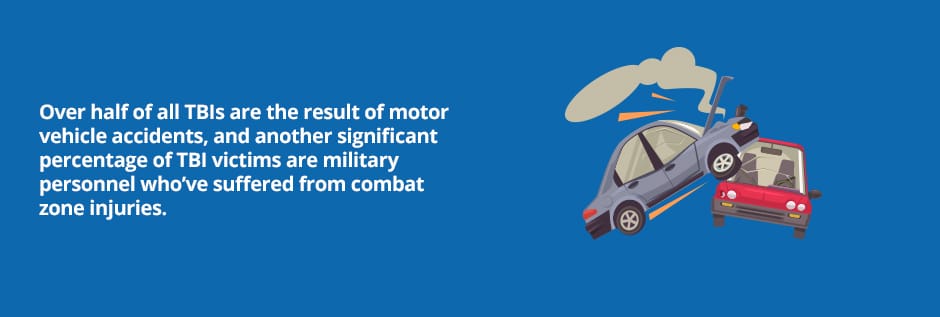
All of us at DuBoff & Associates understand that our legal services are part of a multi-pronged approach to TBI rehabilitation and that it’s part of our responsibilities to set TBI victims and their loved ones up with the very best and most convenient rehabilitation centers in their local area.
We’ve created this list of traumatic brain injury rehab centers so that you can continue researching exactly where you think you or your loved one will receive complete TBI medical attention in a location that’s most convenient for your whole family.
Rockville, Maryland 20852
(240) 858-0384
Sandstone Care consists of several treatment centers throughout the D.C. Metro Area, and they primarily help young adults and adolescents through a whole array of treatment options for mental health treatment and substance use rehabilitation. They accept just about every insurance provider and are state licensed and accredited by The Joint Commission.
They have a multidisciplinary clinical team and help each TBI patient individually through vocational/academic support, multi-family group sessions, individual sessions and community events.
4350 East-West Highway Suite 200
Bethesda, Maryland 20814
(844) 334-6407
The team at Healthy Foundations Group is comprised of psychiatrists, therapists and nurse practitioners who offer a wide variety of customized treatment plans that are always tailored to each patient and their family’s needs. They offer multi-disciplinary approaches to TBI care and work meticulously to determine the source of why a client is struggling.
They always do their due diligence when it comes to getting to know their patients on a personal level, and their treatment modalities include family, group and individual therapy. Their team strives to utilize their expertise in order to help TBI clients overcome the certain physical, mental and emotional obstacles that are blocking them from realizing their fullest potential.
10000 Colesville Road
Silver Spring, Maryland 20901
(301) 684-5013
Their team of licensed professionals help patients of all mental health issues to manage good health habits, achieve personal goals and usher in an overall sense of well being. This treatment facility offers a confidential, safe and supportive environment for TBI victims, and they also utilize technology-assisted venues to help their clients remotely and come to their clients’ homes when it’s too hard to come to them.
They provide holistic services on site in order to help TBI patients spiritually, mentally and physically; and they also utilize a network of professionals for referrals as well to make it easier on patients and their families within certain circumstances.
4111 East Joppa Road Suite 101
Nottingham, Maryland 21236
(443) 429-1167
Hope’s Horizon utilizes individualized treatment plans that help TBI patients get on the right track towards recovery. They specialize in therapy options and offer a wide array of unique types of therapy, including art therapy, cognitive behavioral (CBT), emotionally focused, family, mindfulness-based (MBCT) and solution focused brief therapy.
Although their specialties are medical detox, addiction treatment and dual diagnosis, Hope’s Horizon has remained a prominent rehabilitation facility for TBI patients.
2200 Kernan Drive
Baltimore, MD 21207
(888) 453-7626
This rehabilitation center is located within Kernan Hospital in Baltimore, and it’s a part of the University Rehabilitation Network. Their Traumatic Brain Injury program serves adults and adolescents, and their overall goal for each patient is to achieve the highest levels possible within functionality and independence.
They have kitchen and bathroom setups so patients can re-learn daily living skills, and they offer a large array of therapeutic equipment. They are accredited with the Commission on Accreditation of Rehabilitation Facilities (CARF) and the Joint Commission on Accreditation of Healthcare Organizations (JCAHO).
5601 Loch Ravel Boulevard
Baltimore, MD 21239
(410) 532-3900
The partnership with John Hopkins University School of Medicine helps set this rehabilitation center apart when it comes to treating TBI victims, and individualized care is highly stressed at this rehabilitation center through the coordination of a case manager.
The TBI injury program does wonders in terms of helping patients independently return to their community through the efforts of an interdisciplinary team. This team also includes the patient’s family. They focus not only on physical coping, but also mental coping skills that every TBI patient requires after such tragic injuries.
They are also accredited with the Commission on Accreditation of Rehabilitation Facilities (CARF) and the Joint Commission on Accreditation of Healthcare Organizations (JCAHO).
200 Kernan Drive
Baltimore, MD 21207
The Inpatient Brain Injury Program at this rehabilitation center offers a therapeutic, supportive environment that helps adolescents and adults throughout their TBI rehab. They utilize an interdisciplinary, comprehensive program to help each patient obtain their highest independence potential and ultimately return to their community.
Their inpatient/outpatient system makes it flexible for TBI patients and their families to obtain the appropriate services for individuals who range amongst the severity levels of TBIs. Family involvement is a paramount part of their overall rehabilitation strategy, and they also utilize a support group and education programs to help families and caregivers provide extra support to TBI patients.
2401 W. Belvedere Ave.
Baltimore, MD 21215
(410) 601-9355
LifeBridge Health’s Brain Injury Program’s specific goals are to provide the very best neuro-rehabilitative care to TBI victims, and their staff of brain injury specialists are ACBIS-certified and are more than capable of handling the entire spectrum of brain injury treatments.
Their main goal is always to help TBI victims to resume their lives in a productive and meaningful way. Their inpatient and outpatient services are considered to be potentially the most complete and overarching throughout Maryland.
1750 E. Fairmount Avenue
Baltimore, MD 21231
(443) 923-9200
The Kennedy Krieger Institute’s Center for Brain Injury Recovery is world-renowned and helps young adults and children recover from a whole array of brain injuries. They utilize a 24-hour inpatient program, as well as outpatient programs, to evaluate and treat TBI victims of all varieties up to 21-years-old.
Their Brain Injury Responsiveness program is comprised of an innovative team that for years has been refining the way inpatient TBI victims are treated and rehabilitated.
2200 Kernan Drive
Baltimore, MD 21207
1 (800) 221-6443
This rehabilitation program is the Maryland state affiliate of the Brain Injury Association of America, which is a great connection that allows this local facility to be able to provide some of the most current research and overall best practices from around the entire country to Maryland’s TBI patients.
They offer support groups throughout the entire state and D.C. Metro Area, so family members of TBI patients and the patients themselves can collaborate together with people who are going through the same type of rehabilitation.
2910 Monument Ave.
Richmond, VA 23221
(804) 214-3724
The Family Institute of Virginia is a private TBI rehabilitation center that provides a very broad range of mental health professionals and therapeutic services to families and individuals in need. It was established in 1977 and has gained a great reputation throughout the state over the years, while also remaining on the cutting edge of TBI rehab strategies.
They utilize an interdisciplinary approach that will touch every aspect of a patient’s life in order to provide comprehensive treatment for the individual and their loved ones. Their treatments always involve the whole family, and they consider therapy as a discovery, learning and growth-enabling process.
Traumatic brain injuries are just one of the many issues they help patients with, and they are renowned throughout Virginia as one of the best, private TBI rehabilitation centers.
2121 Eisenhower Ave. Suite 604
Alexandria, VA 22314
(703) 991-4802
The Better Brain Center is known for utilizing cutting edge mental health care techniques for their TBI patients through their neurofeedback, counseling services and psychiatry. They offer a wide array of clinical support, and their team lead by Dr. Adnan Durrani is considered to be not only one of the best medical teams in Virginia, but the entire east coast.
Neurofeedback is one of their cutting edge treatments that help TBI patients re-train their brain to respond to certain stimuli and stresses. This type of treatment can narrowly focus on specific brain areas, which allows the Better Brain Center team to finely target and improve brain function on an individual basis.
Fairfax, VA 22031
(240) 847-0735
Sandstone Care provides mental health services for patients between 13 and 18 years old, as well as young adults from 18 to 30. This includes day treatments, extended residential care, intensive outpatient and general outpatient treatments.
They focus in on the entire ecosystem of each patient, so for TBI patients this will include providing individual and family therapy sessions, academic and vocational support, and much more.
Although traumatic brain injuries are just one of the many issues that Sandstone helps patients with, they are still considered a top provider of TBI rehabilitation throughout Virginia.
McLean, Virginia 22101
(888) 229-3154
This is a rather famous rehabilitation center that has locations all across the world, including in McLean. It is known for hosting very wealthy patients who are suffering from a whole array of mental health issues, including traumatic brain injuries.
Although this treatment center is more luxurious and expensive than most of the others in Virginia, that doesn’t mean that it lacks behind in quality care at all. When families of TBI victims pay the extra money that it does cost to get treatment at The Scott, the patient will also receive advanced clinical and medical care.
1300 E. Marshall St.
Richmond, VA 23298
(804) 828-0861
The Brain Injury Rehabilitation department at VCU is considered to be one of the very best inpatient/outpatient TBI treatment programs in the entire country. It’s located at both the Hunter Holmes McGuire VA Medical Center and at VCU Health, and their programs emphasize enhancing a TBI patient’s overall functional independence and quality of life through social activity participation, preventative care and health maintenance education.
This self-contained unit treats adolescent and adult patients with TBIs that stem from all different causes/accidents, and it also helps with less traumatic brain injuries like brain tumors, hemorrhages and aneurysms. This intensive rehabilitation program emphasizes therapeutic intervention, functional assessment, community reintegration and long-term follow-ups.
4341 Ridgewood Center Dr.
Woodbridge, VA 22192
(571) 285-2480
Brain Injury Services is a unique TBI rehabilitation center that specializes in case management by addressing the overall needs of patients who have trouble with behavioral, cognitive and physical functioning. They help TBI patients and their families to minimize the need for any kind of institutionalization and ultimately maximize a patient’s abilities to thrive within their local community.
They offer a whole array of programs and services that aim to provide assistance in the Northern Virginia area, as well as Winchester, Fredericksburg and several other counties.
8101 Hinson Farm Rd. #401
Alexandria, VA 22306
(703) 664-7000
This is a state-of-the-art medical facility and rehabilitation center that is known for its awards and recognition throughout the American medical industry. Their rehabilitation center is ranked amongst the top in the country, which is partly due to this hospital having one of the very best and most experienced medical staffs in the entire state of Virginia.
1701 N. George Mason Dr. Suite 2-E
Arlington, VA 22205
(703) 200-5051
This rehabilitation center utilizes medical and therapy care, as well as multidisciplinary nursing in order to assist with the emotional and physical needs that TBI patients require. They mainly focus in on overall neurological and cognitive function recovery, improving swallowing and speech, increasing mobility and physical ability, and recovering the necessary skills for daily activities.
They also emphasize educating family members and patients throughout the entire rehabilitation process, and this includes a better understanding of the recovery stages for TBIs.
This facility is known for offering a wide variety of specialized treatment and equipment that goes above and beyond many other TBI treatment centers throughout Virginia.
Blacksburg, VA
(800) 743-6802
NeuroRestorative is a well-known provider for brain and spinal cord injury rehabilitation services across the entire country, and their location in Blacksburg is in the very heart of the Virginia Tech University community. This location offers a whole array of support services and programs that help TBI patients, including their neurobehavioral, neurorehabilitation, respite, supported living and day treatment programs.
28 Andrew Russell Lane
Fisherville, VA 22939
(540) 332-7000
WWRC provides an array of services for clients with a TBI, including the following:
These services are meant to help patients obtain a more functional independence and enhance their overall opportunities for future employment once their treatment is completed.
The WWRC staff utilizes a collaborative effort to treat and evaluate clients with TBIs, and each patient will obtain a ‘brain injury team’ that works together to create a unique, individualized service program.
7700 Arlington Blvd. Suite 5101
Falls Church, VA 22041
(800) 870-9244
This facility is a member of the U.S. Military Health System, and the DVBIC is known for being the TBI center for the Defense Health Agency since its founding in 1992. The core mission of this treatment center is to help veterans and service members to reintegrate themselves into their local communities after suffering mild to severe TBIs.
This facility helps service members from the moment of their injury all the way to the point of their return to duty or community reintegration. They’ve taken on a number of very important database and research duties for the U.S. military, and still today are an integral part of helping U.S. military men and women who fall victim to TBIs of all types.
102 Irving Street NW
Washington, D.C. 20010
(202) 877-1000
The MedStar National Rehabilitation Hospital has been widely known as one of the United States’ best medical facilities that specialize in spinal cord and brain injuries. Their team of award-winning physicians and vocational rehabilitation counselors, among many others, have access to some of the most cutting edge assistive technology and equipment within the TBI treatment field.
They also specialize in TBI treatment research and education. They are also CARF and JCAHO certified.
900 23rd Street NW
Washington, D.C. 20037
(202) 715-4000
The therapists who specialize in neurological rehabilitation at this hospital deal with much more than just TBI patients, but they are still considered some of the very best TBI specialists in the entire country. They’ll utilize an entire multidisciplinary team to conduct occupational, physical and speech-language treatments in order to help patients fully restore their functionality and independence.
These medical experts consider many types of neurological rehabilitation as a great alternative to pain medication and sometimes even surgery. They use a whole array of therapy techniques that are customized to each TBI patient, and their impeccable track record speaks for itself.
1232 17th St. NW
Washington, D.C. 20036
(202) 659-0122
This is a TBI treatment facility that was created in 2007 on the foundation that every member of the board of directors was in some way affected by a traumatic brain injury directly or indirectly. Their overall mission is to create brighter futures for all patients who suffer from all calibers of TBIs through research, education, prevention, and fundraising.
There are quite a few factors that come into play when someone suffers from a brain injury, and you’re always going to want a proper legal game plan to help you and your family get through such a tough time a little more easily. Call us for a free consultation so we can discuss your injury and see what your options are with your insurance company and so much more.
At DuBoff & Associates, it’s always our goal to ensure that you and your loved ones get the very best medical treatment available as we fight to ensure you get fairly compensated for all of your losses. Contact us through this contact form or at 866-640-6665.

Imagine an occurrence that happens across the state all of the time. A pedestrian (or perhaps a bike rider) is enjoying the day. He or she is doing nothing wrong until you fail to cross the street in a marked crosswalk. You’re just a few feet over the line. Suddenly, a vehicle screeches from behind, slams into the individual, and he or she flies into the air before hitting their head on the ground. That driver is intoxicated. Who is at fault?
Most people would say that the driver is at fault and should cover all of the damages the individual suffered. After all, the driver was breaking the law, he or she lost control over the vehicle, and that driver struck another person. The problem is, that’s not what’s happening under current Maryland laws. This is why it is so important for you to seek out legal help if you’ve been in an accident on a bike or just walking the dog. With a bike accident attorney, such as our team at DuBoff & Associates, Chartered, you’ll gain more insight into what happened.
Luckily, some laws may be changing, thanks to SB 465.
Senate Bill 465 was a bill specifically designed to provide protection to bike riders and pedestrians as adopted in Washington, D.C. two years ago. It would help to protect your right to file a claim against the negligent party and receive full compensation for what is owed to you. To understand how, we need to discuss comparative negligence and what it means.
Currently, the Maryland law system is comparative negligence-based; it’s contributory negligence–no excuse or negligence on your part or you cannot recover at all. Harsh, but that’s the MD law right now. In comparative negligence, which the Senate Bill 465 proposed, a legal defense can work to reduce the amount of damages a person can recover based on the degree to which the plaintiff’s negligence contributed to the injury. this form of negligence, a legal defense can work to reduce the amount of damages a person can recovery based on the degree to which the plaintiff’s negligence contributed to the injury.
Let’s make this simple and see why it is so devastating to many people who have suffered injuries and losses. In our above example, the pedestrian did have some fault involved. That person did not walk within the lines of the marked crosswalk. It could have been just a few feet. He or she may not have even noticed. Under current laws, some of the negligence in the case then can be attributed to the pedestrian.
Now, had that individual been within the crosswalk and obeying every other law, the drunk driver would be fully responsible for the losses. But, in this situation, the driver’s legal defense could help to protect them from full negligence claims like this. That’s what comparative negligence would provide for.
However, SB (comparative law) works toward changing that. Under this law, it means, simply, that the driver’s negligence is not minimized in any way when the other party is minimally at fault. It’s clear that, in this situation, the pedestrian had no way of knowing the risk, and should not have suffered loss. Washington DC has this law now. And, these bills are not new. Over 46 other states have them in place. Maryland is simply lacking in this key area.
For many people in Maryland, one thing is for sure. We’re busy, active people with a lot on our mind and plenty to do. However, this is one bill that every person that walks on the sidewalk or rides a bike needs to take note of. The reason is simple. Insurance companies are working hard to block SB 465. The bill could mean they would have to pay thousands – even millions – of dollars more to the average person.
Here’s an example. In the above example, the court may determine that the pedestrian is 10 percent at fault. When you are talking about millions of dollars in losses from the drunk driver’s negligence, 10 percent can equate to hundreds of thousands of dollars. By blocking this bill, insurance companies hope to reduce the amount they have to pay out to cover these losses.
And, that would mean that this pedestrian, who was just out for a walk, who had a family at home and perhaps a job to go to the next day, suffers financial hardship through truly no fault of his or her own. SB 465 is truly a win for bike riders and pedestrians who do not stand a chance when a two-ton vehicle is coming at them, driven by a drunk driver at high speeds. Insurance companies want to minimize their costs, but the result of doing so is making individuals like this the victims.
It’s true – insurance companies never have the victim’s best interests at heart. We do. For your free consultation to discuss your incident with a pedestrian accident attorney, before you settle with any insurance company, call DuBoff & Associates, Chtd. We’re here to go to work for you and to ensure you get fair compensation for your losses. Call 301-495-3131or use our contact form.
Every day in the U.S., 153 people die from a traumatic brain injury (TBI). Of the nearly 300,000 who survive a TBI, some are injured so severely their lives will never be the same. They struggle to get back the physical and mental capabilities they had before their injury.
Most of those who experienced a brain injury (BI) of any kind long to be self-sufficient. They seek employment, but due to the residual effects of their injury, they find this difficult since they may be impaired either physically, cognitively, emotionally or all three.
Those who suffer a BI often have cognitive, physical, or emotional impairments that affect their ability to find a job. Some disabilities which are barriers to employment are:
This include things like a shortened attention span, difficulty remembering things, decreased communication skills and a lack of reasoning and problem-solving skills. Those with a cognitive disability may also have trouble remembering things, so directions may need to be given several times or provided in writing.
Some people may suffer long-term or permanent paralysis. Others may have weakened limbs and suffer from lack of coordination, making it difficult for them to walk or to grasp with their hands. They may have impaired vision or hearing, and have difficulty sleeping. Many are unable to drive and must learn how to use alternative methods of transportation. Some may require the use of a wheelchair, which may affect the way they can move around in the workplace.
Many have difficulty controlling their emotions and may cry or laugh improperly and at inappropriate times, or have difficulty controlling their anger. They may succumb to periods of depression, and may exhibit impulsive behavior.
Those who previously were believed to be unemployable due to their disability may be able to find employment if they work within a system where there are now advocates and services that can help them overcome previous barriers to their employment.
Every state has a Vocational Rehabilitation Services Agency (VR) which has as its mission to help those with disabilities find employment. Every year, they assist thousands of people with disabilities to obtain job skills and ultimately become successfully employed.
VRs were established primarily to help those with physical disabilities. Since people with BIs who are seeking employment often have disabilities that are not visible, the severity of their disability may be discounted. In order to obtain VR services, those with a BI that results in cognitive or emotional disabilities and not physical ones must prove that their injury, although not immediately visible, is severe enough for them to qualify for services.
Even after a person with a BI convinces the counselor that they qualify for services, the VRs are required by law to assist those with the most severe disabilities first. Evaluations by a rehabilitation physician and neuropsychologist are often necessary in order to prove the person with a BI is indeed entitled to prompt services.
VRs experienced in dealing with those with a BI can be extremely helpful. Unfortunately, in some areas of the country, it may be uncommon to find a counselor with BI experience. That puts the onus of helping the counselor understand the limitations a BI has caused on the shoulders of the person with the BI. The injured person may need to provide the VR counselor with educational materials about the impact of a BI, how it changes lives, and how employers can benefit from employing them.
Once the hurdle of qualifying for services is over, the VR helps prepare those who are disabled in any way due to their BI to gain the skills they need for a particular job, prepare them for job interviews, and help them to understand what accommodations to ask the employer about during the employment interview.
Some specific services provided by some VRs include:
The Maryland VR, operated under the state Division of Rehabilitation Services offers services to “people with physical, emotional, intellectual, developmental, sensory and learning disabilities.” In addition to career assessment and counseling, it also provides education, job training, technology assistance, and job placement services.
Applicants for services must prove they are eligible for services. Those who are receiving benefits under the Social Security Administration (SSA) are automatically eligible.
VRs generally are aware of the most important elements of successful VR experiences for people with BIs. This includes early intervention, employer education, work trials, supported employment, a “place then train” program, and long term follow-up.
The earlier those with a BI begin rehabilitation, the better the outcome. This means including the prospect of returning to work as part of the rehabilitation plan. This is true even if it is clear that there will need to be a long period of rehabilitation time, which also means it will be a long time before returning to work will be a realistic option.
Some people want to hide their disability and not inform their employer or coworkers that they had a BI. For those who qualify for VR services, this is generally a mistake.
Employers are, or can be, educated about the value a person can bring to the workplace despite the disability. Also, if employers are aware of the disability, they can make the necessary legal accommodations. In some cases, an employer may be eligible for a financial incentive offered by the state or federal government for hiring someone with a certain disability.
Former employers of the person disabled by a BI are, for the most part, supportive of bringing the person back to work to their old job. If this is not possible, former employers are known to work diligently to find an alternate placement for the BI employee somewhere within the organization.
An employer, and even the brain-injured potential employee, may have reservations about the ability of the injured person to do the job. Convincing either or both of them to give it a trial has often been successful. It may then lead to permanent employment.
Initially, a brain-injured person may need a job where they can have a job coach available as he or she learns how to do the job. The job coaching needs diminish as the employee becomes more comfortable at the job. Eventually, the coach will no longer be needed.
Traditionally, people are trained to do a job before they seek employment. Those with a BI have been found to do better if they have on-the-job training with the assistance of a job coach. That gives them the opportunity of learning what is specifically required of them, which is easier for them than transferring their general training to the specific job description.
The most common reason people with BIs lose their jobs is that there was a change in the job requirements, or a change in the work environment that upsets them. This can range from having a new supervisor, or a change, even a simple change, to their job duties. If a counselor or job coach is involved and providing long term follow-up, the counselor can intercede with the employer and work with the employee in adjusting to the new situation.
In 1990, the Americans with Disability Act (ADA) was made into law. It is a civil rights act designed to protect those with disabilities from discrimination in all areas of public life, including protection against discrimination by employers. This means that employers cannot refuse to hire someone who is otherwise qualified for a job simply because the person has a disability.
The ADA also prevents an employer from firing, or refusing to offer a person who is otherwise qualified a promotion or job training based solely on the employee’s disability. A qualified individual with a disability is defined as “a person with a disability who satisfies the requisite skill, experience, education and other job-related requirements of the employment position such individual holds or desires, and who, with or without reasonable accommodation, can perform the essential functions of such position.”
A reasonable accommodation is defined as, “any modification to a job or the work environment that will enable an applicant or employee with a disability to participate in the application process or to perform essential job functions.”
Some examples of reasonable accommodations are:
Employers are not required to pay for accommodations themselves, and there are federal funds available to compensate them for changes they make. Employers may avoid making accommodations if they can show that such an accommodation creates an “undue hardship” for them. But, they cannot refuse to make accommodations, or refuse to hire someone with a disability, if the disability interferes with the person’s ability to perform minor duties that are not essential to the performance of the job.
Those with a BI who are seeking employment need to let the employer or prospective employer know about accommodations as soon as possible. Employers need advance notice in order to make many potential accommodations. They are not required to make any accommodation if they have not been notified of the need to make such an accommodation and the accommodation requested must be reasonable.
The Social Security Administration (SSA) administers two programs designed to assist people who have a medically related disability:
The SSA has no provisions for paying benefits to those who are only partially disabled or disabled for only a short period of time. The qualifications that must be met in order to qualify for benefits under the SSA definition of disability are:
The SSA periodically reviews a case to determine if a person receiving benefits is still disabled. In turn, the disabled person is expected to keep SSA informed of any improvement in their medical condition.
The SSA offers assistance to those who receive benefits with a goal of helping them increase their self-sufficiency and return to work. The program helps then in preparing to reenter the work force and in maintaining that employment.
When people begin receiving benefits under the SSA, most of them become eligible for the Ticket to Work Program which has as its goal to help those with disabilities to reenter the workforce. To help them meet that goal, under this program, the injured person can choose to use the services of an Employment Network (EN), a vocational rehabilitation services provider, or any other services provider that is designed to help them achieve the goal of returning to work.
Whichever service provider the disabled person chooses to work with, the idea is to put a plan together with a goal for the person receiving disability benefits to reenter the workforce.
Participating in the program does not affect the receipt of benefits. Benefits continue until the person actually begins earning wages or income from self-employment. The program is also designed so those who become self-sufficient by earning an income are still able to keep their Medicaid or Medicare.
There are many aspects to the Ticket to Work program. SSA has provided a FAQs section on its website to assist those who are receiving SSA benefits in understanding the Ticket to Work program.
In addition, for those who are receiving SSA benefits, every state has a program called Protection and Advocacy for Beneficiaries of Social Security (PABSS). PABSS staff assist people who are receiving SS disability benefits in “obtaining information and advice about receiving vocational rehabilitation and employment services.”
The Work Incentives Planning and Assistance (WIPA) program, formerly known as the Benefits Planning Assistance and Outreach (BPAO) program, is designed to help those with disabilities who want to work, but still face barriers in finding employment.
The U.S. Department of Veterans Affairs provides vocational rehabilitation and employment services (VR & E) to those who have a service-related disability and find it difficult to work in their former occupations. The goal is to help the veterans find suitable employment. Suitable employment is defined as employment that is: 1) within a veteran’s physical and emotional capacity; and 2) matches his or her skills and interests.
All veterans who are on active service who expect to receive a discharge other than dishonorable, and have received a memorandum rating of 20 percent are eligible for VR & E services. Veterans who received a discharge other than dishonorable, and have a service-connected disability rating of 10 percent, are eligible for VR & E services.
After eligibility for services is established, the veteran will meet with a VR counselor (VRC). Together, they will put together a rehabilitation plan. In order to determine a realistic plan, the two will work together to, among other things:
The purpose of the plan is to assist the veteran to meet his or her goal of self-sufficiency and employment.
Like it or not, cell phones have become an essential part of our culture. With easy access to friends and family, plus limitless knowledge at our fingertips, any stray thought or moment can be shared, Tweeted, Instagrammed, or messaged to our circles.
While these devices are usually a blessing, they can also be a curse–especially behind the steering wheel. As technology continues to advance, distracted driving and its deadly consequences continue to increase. Further, Maryland is far from exempt.
Since 2012, law enforcement handed out over 32,000 traffic violations to Montgomery County drivers for distracted driving. Over 15,000 traffic violations were handed out during 2014 and 2015. Here’s a breakdown of the data:
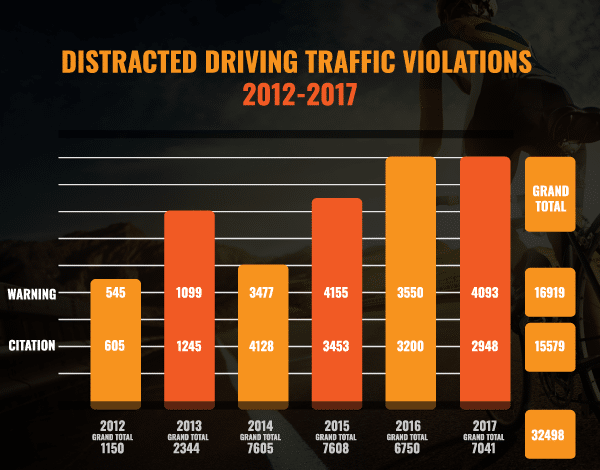
You might notice the giant leap in traffic violations from 2013 to 2014. After 2013, cell phone technology advancements truly came underway. In 2013, social networking on cell phones became more popular than ever, which explains the jump from the number of traffic violations in 2012. In 2014, better cameras, more selfies, Instagram, dating apps, and the app store (in general) completely changed the game. With all those new changes, it’s no wonder why people were so glued to their phones everywhere they went.
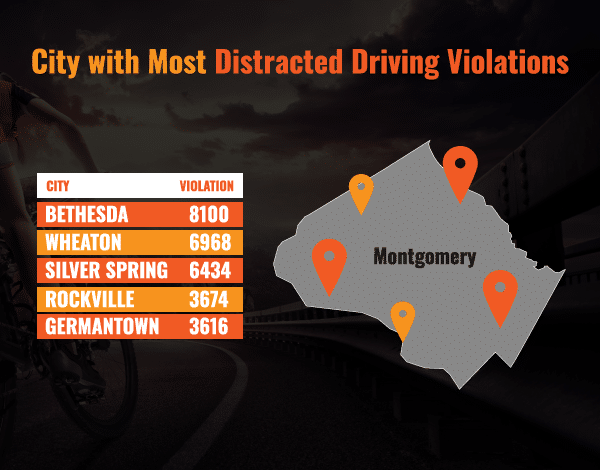
The three cities with substantially higher numbers of stops were Bestheda (8,100), Wheaton (6,968), and Silver Spring (6,434). This is not surprising as these are the most populated areas.
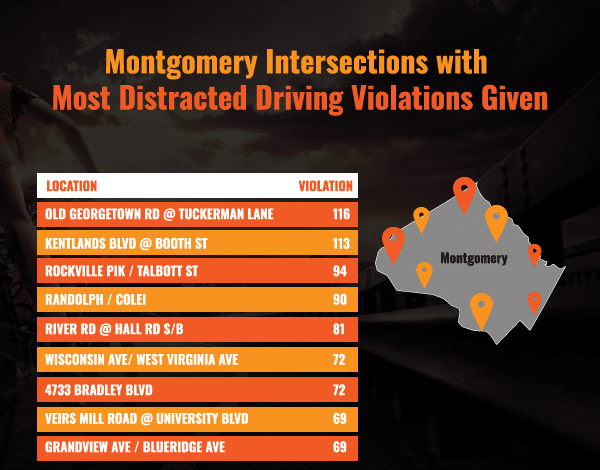
You may know that intersections are inherently dangerous. They are even more dangerous when motorists are distracted while driving.
The intersections where drivers received the most distracted driving citations occurred on Old Georgetown Rd. at Tuckerman Lane in Bethesda(116), Kentlands Blvd. at Booth St. in Gaithersburg (113), and Rockville Pike and Talbott St in Rockville. (94).
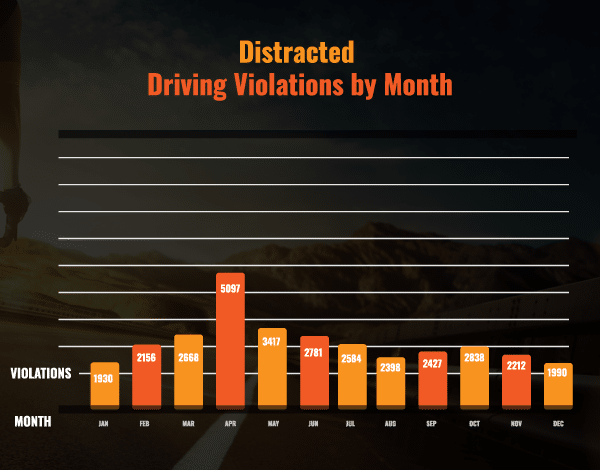
The fewest amount of traffic stops occur during the winter months (December, January, and February). Luckily, drivers are more aware of the types of dangers present on the road during these months (ice, potholes, slick roads, etc.). Take note of how the amount of traffic stops increase as the weather gets warmer.
There aren’t many instances of bad road conditions during the warmer months (other than the occasional pothole or rain storm that may make the roads slippery). Therefore, drivers may feel less inclined remain alert of their distracted driving habits. Here are the top 3 months that have the most traffic stops:
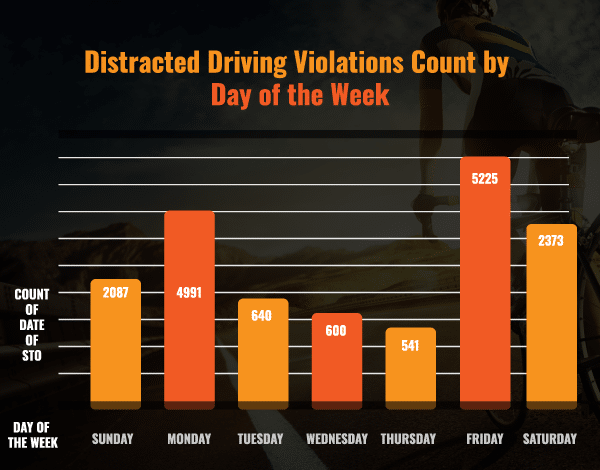
Over the span of our data, the highest amount of distracted driving traffic stops have occurred on Mondays and Fridays.
If you’re curious of when distracted driving traffic stops most frequently occur (so you can stay safe and out of the way), look no further.
Surprisingly, these stops do not occur as often during rush hours in Montgomery County.
The fewest amount of traffic stops occur between 1 AM and 6 AM, where each hour has fewer than 200 traffic stops–most likely because there are fewer people on the road during these hours.
Hopefully, these conclusions will prove helpful in battling the distracted driving epidemic in 2018 and years to come. The best defense, of course, is putting down the cell phones while driving. Motorists already know that distracted driving can be fatal (which is why laws exist to deter these bad habits). These drivers must also be equipped with the knowledge that, should they decide to drive while distracted, the officers of Montgomery County will not hesitate to intervene.
If you’ve been injured in an accident in Montgomery County contact our accident attorneys today for a free consultation.

Once you receive a denial to your insurance claim, you may think that your only option is to just pay for your medical injuries and damages out of your own pocket. Yet you do have another option. You can appeal your claim and make a formal demand for compensation.
Before you take any steps in appealing your claim, you want to understand the reason for the denial. Did you wait too long to inform the insurance company about the accident? Is the injury covered by your insurance policy? Were there any policy exceptions that your personal injuries fall under where your claim could be denied, and is your policy still active? All of these instances can be used by your insurance company to deny your claim. There are also other reasons why an insurance claim may be denied:
Always look at the denial letter to see if the insurance company provided a reason for denying your claim. Once you know the reason, you can take the steps necessary to prove your case to the insurance company so that they will not be able to deny your claim a second time when you reapply.

Most insurance companies will have an appeals process, and many states may require that an insurance company to go through arbitration or an appeal’s process for all denied claims. The length of this particular process can vary. It is always ideal to have legal representation as your attorney will have more knowledge about these claim cases and arbitration stages with insurance company. Then they can leverage their legal experience to help you win your claim and seek out the compensation amount that you demand.
You should appeal any insurance claim that you feel should be compensated. You should also appeal your claim if you feel that the insurance company is engaging in improper claim denial practices. Your attorney will be able to review state laws in regards to prohibited acts and make an additional claim toward the insurance company for engaging in such illegal practices that go against state laws. If you go through all the steps in appealing a denied claim and the insurance company still will not offer compensation, you may decide to file a lawsuit.
